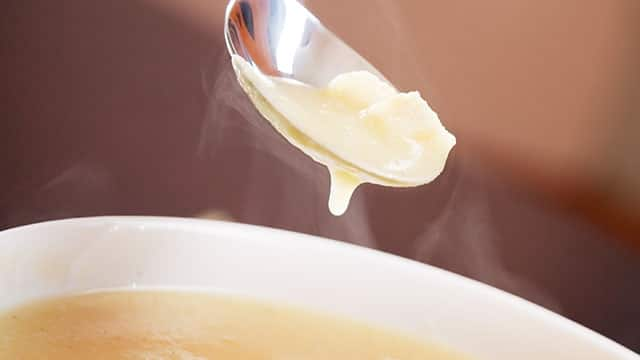What Is Tea Tree Oil?
When we talk about tea tree oil, we're referring to pure essential oil from a shrubby tree from the Melaleuca genus — and usually Melaleuca alternifolia, a shrubby tree native to Australia. Fragrance oils and blended oils won't have the same benefits as 100 percent tea tree essential oil. The volatile oil distilled from the plant has a sharp, camphorous odor, and it's traditionally popular in home remedies. It turns out this popularity has scientific backing — a variety of clinical studies have shown the oil to have antibacterial, antifungal, and antiviral activity, in addition to some early evidence of anti-inflammatory action.
Can Tea Tree Oil Help My Teeth?
In theory, the antibacterial properties in tea tree essential oil can help control bacteria in the mouth. This can help keep mouths healthy, avoiding tooth decay and plaque buildup. Plaque buildup is related to periodontal disease, which can lead to complications like receding gums. The tricky part is that you don't want to ingest tea tree oil. The Mayo Clinic says tea tree oil is generally considered safe when applied topically, but to avoid oral use, as it can be toxic when swallowed.
How Can I Use Tea Tree Oil For Oral Care?
Some people advocate making DIY toothpastes and mouthwashes with tea tree oil with the caveat that it should always be completely spit out and never swallowed. If that seems like a risky proposition, a more straightforward way to approach tea tree oil might be to look for products that contain tea tree oil, and ask your dentist about those specific products. If there are people in your household who might not understand that these products shouldn't be swallowed, such as children, consider keeping them out of reach or opting for products with other types of active ingredients.
Tea Tree Oil for Oral Health
In general, tea tree essential oil seems to show promise for the support of oral health. Research supports claims of the oil's antimicrobial properties, and hopefully more research into the use of tea tree oil for oral care will add to our body of knowledge. If you are interested in using tea tree oil, ask your dentist about products containing the ingredient. Be sure not to swallow any preparations made with tea tree oil, as it can be toxic when consumed orally.
Oral Care Center articles are reviewed by an oral health medical professional. This information is for educational purposes only. This content is not intended to be a substitute for professional medical advice, diagnosis or treatment. Always seek the advice of your dentist, physician or other qualified healthcare provider.
ORAL HEALTH QUIZ
What's behind your smile?
Take our Oral Health assessment to get the most from your oral care routine
ORAL HEALTH QUIZ
What's behind your smile?
Take our Oral Health assessment to get the most from your oral care routine















